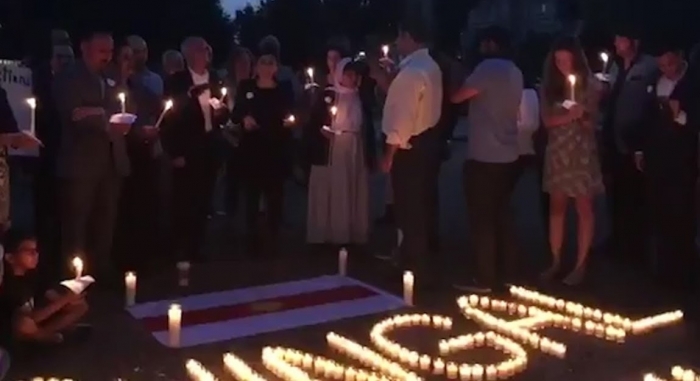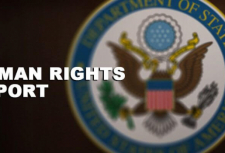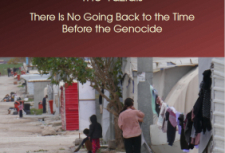Yezidis in ancient India, or Indians in ancient Mesopotamia?: Re-imagining Ancient Yezidi Origins

Mija Sanders
University of Arizona, Tucson, USA
“War on Terror” and Other U.S. Political Narratives
Recently Yezidi activists are finding new forums in which to share their narratives of trauma, persecution, and victimhood. I believe it is very important to examine the contexts in which Yezidis are finding a voice, especially in a powerful country such as the United States. In order to facilitate increased mobility for Yezidi refugees to the U.S., Yezidi activists will need strong bipartisan allies under a Trump Administration. It is also important for stakeholders, academics, and policy makers to consider the political contexts in which advocacy for vulnerable groups such as Yezidis is occurring. This is especially crucial since Donald Trump has taken office and has promoted anti-immigrant and anti-Muslim policies (Thangaraj, 2017). In 2016 the Mir informed me that Yezidi leaders met with Senator John McCain’s office to warn him about “Muslims” and to encourage the Republican party to ban Syrian refugees and other Muslim migrants. Indeed, they problematically conflate all Muslims as potential radical Muslims who could attack like ISIS. This in in spite of the fact that radical Sunni Muslims began to destabilize the region through U.S. occupation. They have launched broad campaigns to alert the world to the Muslim conspiracy of terror and violence, and impending attacks. This kind of language has been embedded within humanitarian claims for support for Yezidi refugees. Yezidi activism and advocacy, and their international voice, finds resonance with the Hindu nationalist diaspora and Rashtriya Swayamsevak Sangh (RSS) political movement in Arizona. Yezidi and Indian diaspora activists claim common negative experiences with Muslims, and with "Islam”—imagined as a monolithic negative force. Rather than being an isolated discourse, my study suggests that Yezidi and Indian diasporas (Thangaraj, 2019)14, especially upper-class, upper-caste Hindus, in the U.S. have the potential to produce world-making effects through their common Islamophobic platforms and corresponding ethnic-nationalisms. I read these ethnic-nationalisms as historically rooted in unique national contexts, yet also influenced by the diasporic U.S. cultural context. The 2014 targeted violence by ISIS which produced collective trauma for Yezidis in Sinjar, Iraq, has been articulated on an international stage (Buffon & Allison, 2016). My ethnographic study based on oral histories shows that Yezidis continue to define their ethnic identity in opposition to "Muslims," even though Yezidis in the U.S. live largely apart from local Muslim diasporas and have limited interactions with U.S. Muslims. The ways in which Islamophobia stands out as a unifying factor becomes apparent when another group which is highly focused on cultural preservation (such as Hindus) (Shankar, 2014), enters into dialogue with Yezidi community leaders. It becomes clear that Yezidis haven’t focused on cultural preservation in the Diaspora, but rather, have focused on the forces which caused the large migration of Yezidis out of Shingal and Sheikhan since 2014, and during the Gulf war. Most of the Yezidis in Arizona left during the Gulf war, yet, have only recently become involved in activism on broad scales outside of their community. Scholars of the war on terror have emphasized that although historically people of Middle Eastern descent have been legally categorized as “white” they have come to represent the brown bodies of “terrorists” (Gualtieri, 2009; Puar, 2007). These studies assert that Middle Eastern people do not always benefit from “white-skin privilege” (Cable, 2013), even when they espouse ideals of assimilation.
Tags: #yazidisinfo #yezidi #ezidi #history
Yezidis in ancient India, or Indians in ancient Mesopotamia?: Re-imagining Ancient Yezidi Origins

Mija Sanders
University of Arizona, Tucson, USA
“War on Terror” and Other U.S. Political Narratives
Recently Yezidi activists are finding new forums in which to share their narratives of trauma, persecution, and victimhood. I believe it is very important to examine the contexts in which Yezidis are finding a voice, especially in a powerful country such as the United States. In order to facilitate increased mobility for Yezidi refugees to the U.S., Yezidi activists will need strong bipartisan allies under a Trump Administration. It is also important for stakeholders, academics, and policy makers to consider the political contexts in which advocacy for vulnerable groups such as Yezidis is occurring. This is especially crucial since Donald Trump has taken office and has promoted anti-immigrant and anti-Muslim policies (Thangaraj, 2017). In 2016 the Mir informed me that Yezidi leaders met with Senator John McCain’s office to warn him about “Muslims” and to encourage the Republican party to ban Syrian refugees and other Muslim migrants. Indeed, they problematically conflate all Muslims as potential radical Muslims who could attack like ISIS. This in in spite of the fact that radical Sunni Muslims began to destabilize the region through U.S. occupation. They have launched broad campaigns to alert the world to the Muslim conspiracy of terror and violence, and impending attacks. This kind of language has been embedded within humanitarian claims for support for Yezidi refugees. Yezidi activism and advocacy, and their international voice, finds resonance with the Hindu nationalist diaspora and Rashtriya Swayamsevak Sangh (RSS) political movement in Arizona. Yezidi and Indian diaspora activists claim common negative experiences with Muslims, and with "Islam”—imagined as a monolithic negative force. Rather than being an isolated discourse, my study suggests that Yezidi and Indian diasporas (Thangaraj, 2019)14, especially upper-class, upper-caste Hindus, in the U.S. have the potential to produce world-making effects through their common Islamophobic platforms and corresponding ethnic-nationalisms. I read these ethnic-nationalisms as historically rooted in unique national contexts, yet also influenced by the diasporic U.S. cultural context. The 2014 targeted violence by ISIS which produced collective trauma for Yezidis in Sinjar, Iraq, has been articulated on an international stage (Buffon & Allison, 2016). My ethnographic study based on oral histories shows that Yezidis continue to define their ethnic identity in opposition to "Muslims," even though Yezidis in the U.S. live largely apart from local Muslim diasporas and have limited interactions with U.S. Muslims. The ways in which Islamophobia stands out as a unifying factor becomes apparent when another group which is highly focused on cultural preservation (such as Hindus) (Shankar, 2014), enters into dialogue with Yezidi community leaders. It becomes clear that Yezidis haven’t focused on cultural preservation in the Diaspora, but rather, have focused on the forces which caused the large migration of Yezidis out of Shingal and Sheikhan since 2014, and during the Gulf war. Most of the Yezidis in Arizona left during the Gulf war, yet, have only recently become involved in activism on broad scales outside of their community. Scholars of the war on terror have emphasized that although historically people of Middle Eastern descent have been legally categorized as “white” they have come to represent the brown bodies of “terrorists” (Gualtieri, 2009; Puar, 2007). These studies assert that Middle Eastern people do not always benefit from “white-skin privilege” (Cable, 2013), even when they espouse ideals of assimilation.
Tags: #yazidisinfo #yezidi #ezidi #history


























